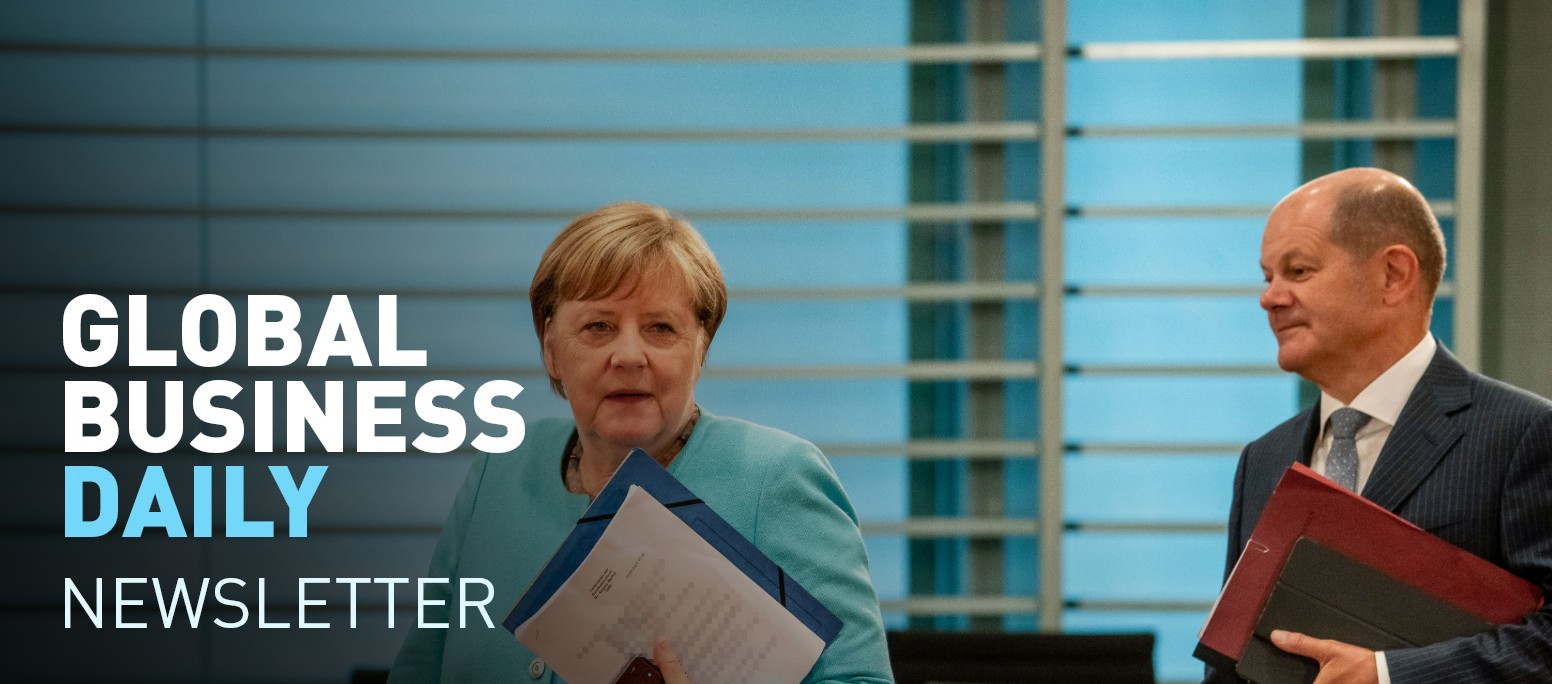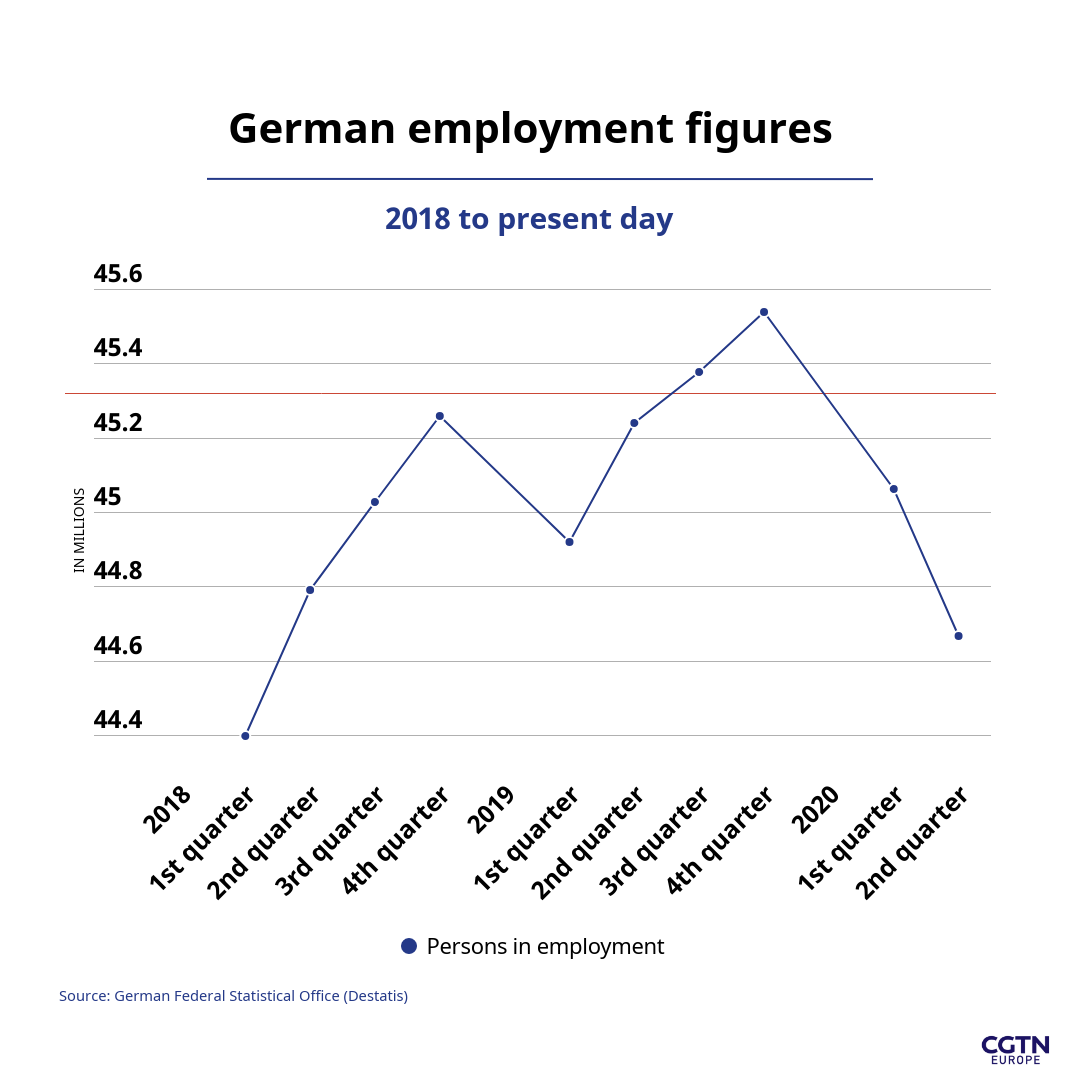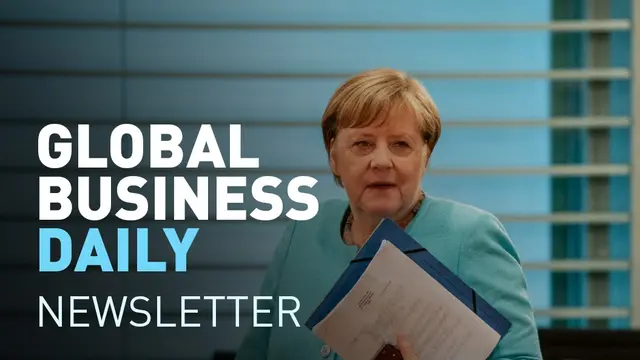"The corona crisis won't suddenly disappear in the next few weeks."
Olaf Scholz, Germany's finance minister's words might sound like a statement of fact but when combined with the growing indications that Germany is set to increase its furlough by two years, they will come as a relief to millions.
The news, if confirmed, will help the 10 million people, and the many German businesses, reliant on the scheme - called Kurzarbeit in German - which it is estimated will cost €10bn ($11.9bn). The decision stands in stark contrast to the UK which is set to abandon a similar scheme in October.
"Businesses and employees need a clear signal from the government: we've got your back for the long haul in this crisis, so that no one is being let go without need," stated Scholz.
A final decision on an extension is expected on August 25.
Berlin will hope that continuing the Kurzarbeit will help stave off job losses which seem to be gathering pace, read below to look at the latest German employment figures.
Also in today's newsletter is an interview with an expert on hydrogen power and its potential to shake up the energy market, and a video examining Serbia's response to help small businesses struggling amidst the coronavirus crisis.
Enjoy reading,
Daniel Harries
Digital correspondent
**P.S. Did you know we send this briefing by email, too? **
Sign up here

Labor unions in Las Vegas began a campaign to get local lawmakers to require employers to return furloughed casino, tourism, hospitality, airport, entertainment and hospital employees to their jobs when the coronavirus pandemic ebbs and business resumes.
Marriott International is facing a London class action brought by millions of former guests demanding compensation after their personal records were hacked in one of the largest data breaches in history.
Amazon has stepped up its moves into the UK's grocery market , expanding its relationship with Morrisons so its Prime members can now get access to the supermarket group's full range on their website.
Dubai again has loosened laws governing alcohol sales and possession of liquor as the country tries to claw its way out of an economic depression worsened by the coronavirus pandemic.
Japan's exports plunged 19.2 percent in July from a year earlier, as the pandemic sapped global demand for goods from the world's third largest economy, government data showed.
British inflation jumped unexpectedly last month, to its highest since March, as clothes shops did not hold their usual summer sales when they reopened after the lockdown.
Americans turned to Walmart and Home Depot for supplies and DIY projects with millions staying at home as the virus surged, resulting in soaring sales for their fiscal second quarter.
Johnson Johnson on Wednesday agreed to pay around $6.5 billion to buy Momenta Pharmaceuticals Inc , in a deal aimed at expanding its portfolio of autoimmune disease treatments.
France is now mandating masks in all workplaces , from the Paris business district to factories in the provinces, as it tries to contain growing infections and stave off another shut down of the economy.
OPEC and allies such as Russia, a grouping dubbed OPEC+, meets to review compliance with oil cuts meant to support oil prices amid the coronavirus pandemic.
Construction of new U.S. homes surged 22.6 percent last month as homebuilders bounced back from a lull induced by the pandemic . The Commerce Department reported that new homes began at an annual pace of nearly 1.5 million in July, highest since February.
Watch: CGTN Europe's correspondent Aljosa Milenkovic examines Serbian President Aleksandar Vucic announcement of a second set of economic measures aimed at supporting local businesses that's worth over $6.8 billion.
02:13

As environmental concerns grow stronger among consumers with each passing year, there is a scramble amongst producers to match that demand, nowhere more than in the transport sector. While electric cars have been around for some time hydrogen power is proving to be an increasingly popular clean replacement for high polluting vehicles. CGTN Europe spoke to Paul Ekins, a former professor of Resources and Environment Policy at UCL on the potential for hydrogen power to transform the transport industry.
Electric batteries obviously dominated the car market. So far, most people haven't even heard of the hydrogen fuel cell for their car. Why is that?
Well, the main reason is economics. Hydrogen fuel cells have been much more expensive in cars than batteries. That's because the hydrogen itself is quite expensive. And also the fuel cells are rapidly evolving technology, but they used to be very expensive. Electric vehicles have been around for a very long time, in fact, in the early part of the 20th century it looked as if electric vehicles would be a serious competitor to the internal combustion engine. But obviously, as we now know, the internal combustion engine won that round… But research has continued on electric vehicles, whereas putting a fuel cell into a motor car has been a much more recent endeavor. But fuel cells are catching up. And if you've got the money, you can actually buy very smart fuel cell cars from some of the Japanese carmakers, which look exactly like ordinary cars. And I think to some extent, the jury is still out as to whether in 30 or 40 years, the car market will be dominated by battery or by fuel cell vehicles.
They may be considered rival technologies by many, but could we see a combination of battery and hydrogen powered cars in the market?
I think it's quite possible that we will see a mixture of these vehicles on the road in the future unless one of them has huge technical breakthroughs and becomes obviously superior either in terms of cost or in terms of performance, as indeed happened between the internal combustion engine and electric vehicles back in the early 20th century. And obviously the internal combustion engine won that and electric vehicles are a very recent incursion now into the vehicle market, largely driven by concern about carbon emissions from combustion engines.
There is a push among fossil fuel companies for nations and blocs - like the EU - to adopt hydrogen promoting policies, why is that?
Hydrogen does provide a way, if you capture the carbon emissions - and that's a very big if - but if you capture the carbon emissions, hydrogen is a way of continuing to use natural gas. And there is a huge amount of natural gas around. And the oil and gas companies can see the writing is on the wall for oil, but they're very much hoping that they can continue to sell their natural gas. And if they can convert the natural gas to hydrogen and capture the carbon emissions and store that securely, then obviously that's a way that they can continue to use the natural gas.
The number of people in employment in Germany declined by 618,000, or 1.4 percent, in seasonally adjusted terms compared with the first quarter of 2020. While the number might seem small compared to the huge declines in U.S. employment, for example, this was the largest decline since German reunification.

Source(s): Reuters ,AP
 简体中文
简体中文





